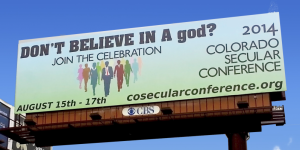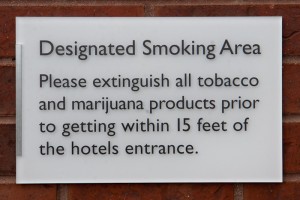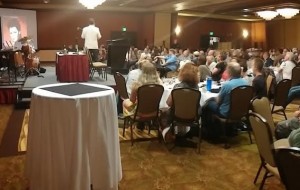Diversity Blooms at Colorado Secular Conference
 The billboard that brought public attention to the Colorado Secular Conference.
(Photo courtesy of Tom Kellogg.)
The billboard that brought public attention to the Colorado Secular Conference.
(Photo courtesy of Tom Kellogg.) When you make “Celebrating Secular Diversity” the theme of your conference, and invite a diversity of speakers to address the topic, guess what happens? You get a diversity of exhibitors and attendees to match!
And that’s what happened the weekend of August 15-17 when the Third Annual Colorado Secular Conference welcomed 200 attendees to Aurora, a suburb of Denver. How much diversity was in evidence? Well, not exactly proportional to the U.S. population, but enough was there to show an obvious improvement over what the secular movement has been used to.
For example, when David Tamayo gave his talk on the work of his organization, Hispanic American Freethinkers, and how it is conducting critical thinking programs in predominately Hispanic schools, he asked for a show of hands of how many Hispanics were in the audience. Four hands went up. Not a lot, but three more than at the last conference at which he’d spoken—a fact which he took pleasure in noting.
A show of hands wasn’t really necessary, however. The ethnic, age, and lifestyle diversity was evident to any casual observer who took a moment to notice. Two former black ministers, a woman and a man, were in attendance. There was free expression in dress, hairstyle, and all the rest. And through my own media seminar Friday afternoon, and in private conversations during the rest of the conference, I found myself advising a diverse range of activists on how best to market themselves through the media and how best to form secular alliances through the United Coalition of Reason.

You know you’re in Colorado when you see a sign like this just outside the hotel. (Photo courtesy of Jesse Bond.)
Launching the theme with a bang was Greta Christina’s keynote address, “Diversity in the Atheist Movement: Some Thoughts on Why and How.” She argued cogently that involvement by secularist organizations in the civil liberties and economic struggles of minority groups doesn’t constitute mission drift. Indeed, by just sticking to the seemingly universal core issues of church-state separation and the rights of atheists, organizations in our movement are unwittingly saying that the key concerns of the very minorities they seek to recruit aren’t important.
The following day, along this same train of thought, journalist Jamila Bey noted that civil liberties violations affect everyone. If government is violating the civil liberties of minorities, the civil liberties of majorities could be next. So minority struggles are everyone’s struggles—especially of that minority known as atheists. And both Christina and Bey drew attention to how often predominately white organizations ignore their claim to stick to a narrow slice of core issues. They adopt highways, raise funds to fight disease, and engage in other public relations-enhancing social endeavors. How then can it be mission drift to enhance a group’s image in minority communities as well?
In her talk Mandisa Thomas, founder and president of Black Nonbelievers, offered a practical approach to diversity in secularist groups, listing specific actions that groups could take to build diversity. Or, if a group wanted to stick to its own particular demographic, then diversity could be achieved by that group making alliances with secularist groups of different demographics. Her role as coordinator of the Atlanta Area Coalition of Reason was an example of the latter.
American Humanist Association President Becky Hale called on secularists to take a page from the LGBTQ approach by standing up and being visible. They should show their non-believer status in their community through their volunteerism and other non-work activities. For by making secularism positive and “acceptable” in the United States, atheists and humanists would be supporting the embattled activists in the other countries who are struggling against violent repression.
Mikey Weinstein, president of the Military Religious Freedom Foundation, spoke forcefully on the problem of dominionist Christian persecution in the military—persecution not only of atheists but of people of faith, including many evangelical Christians who just aren’t fascistic enough to suit those seeking religious hegemony. And Andrea Steele-Meyer of the Freethought Film Festival previewed an opinion documentary exploring diversity issues in comedy, asking complex questions about what is funny, what is offensive, why this is so, and how we should respond to it.
Speaking of comedy, Saturday night was the “Godless Heathen Comedy Extravaganza” featuring Raul Martinez (an American Humanist Association board member), Steve Hill, Thea Deley, and the Church of the Nones. Sunday afternoon Steve Hill followed his previous night’s comedy by introducing a sobering and powerful film by Jeremiah Camara, an African American man who traveled the country noting how black neighborhoods overflow with churches and also suffer powerlessness and poverty. Camara asks pointedly if there is a correlation.

A raptly attentive audience watches Seth Andrews expose the copycat tactics of evangelicals. (Photo courtesy of Dave Fangrow.)
Other speakers included Seth Andrews of the Thinking Atheist, James Barron of the Boulder Atheists, August Brunsman of the Secular Student Alliance, Matt Dillahunty of the Atheist Experience television program, Hemant Mehta of the Friendly Atheist blog, and Amanda Metskas of Camp Quest. Sunday Assembly Denver held its first-ever service Sunday morning featuring rousing songs and an inspiring talk by Candace Gorham that made reference to her work as a play therapist for children. And the first-ever EvolveFish awards were given to honor the pioneering work in Colorado by Marvin Straus, Gary Betchan, and Jesse Bond.
The conference as a whole, in league with the Pikes Peak Atheists and the Secular Hub, sought to raise money to buy school supplies for the children of area low-income families.
In sum, the 2014 Colorado Secular Conference, organized by the Colorado Coalition of Reason under the direction of Tom Kellogg, fostered new directions for the secular movement. No wonder the American Humanist Association will be holding its national conference jointly with this one May 7-10, 2015!
